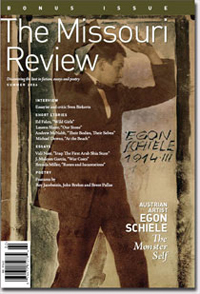The Missouri Review: Difference between revisions
→Notable contributors: tweaked |
Undid revision 198581987 by 72.241.103.122 (talk)remove unreferenced |
||
| Line 34: | Line 34: | ||
*[[Bret Lott]] |
*[[Bret Lott]] |
||
*[[Russell Banks]] |
*[[Russell Banks]] |
||
*[[Bart Skarzynski]] |
|||
*[[Frederick Busch]] |
*[[Frederick Busch]] |
||
*[[Bob Hicok]] |
*[[Bob Hicok]] |
||
*[[Tobias Wolff]] |
*[[Tobias Wolff]] |
||
*[[Ha Jin]] |
*[[Ha Jin]] |
||
*[[Erin McGraw]] |
|||
*[[Moira Crohn]] |
*[[Moira Crohn]] |
||
*[[Andrea Barrett]] |
*[[Andrea Barrett]] |
||
Revision as of 06:58, 9 April 2008
 | |
| Type | Quarterly magazine |
|---|---|
| Format | Magazine |
| Owner(s) | University of Missouri |
| Editor | Speer Morgan |
| Founded | 1978 |
| Headquarters | Columbia, Missouri |
| ISSN | 0191-1961 |
| Website | http://www.missourireview.com/ |
The Missouri Review is a top-ranked literary magazine, one of the top five according to The Christian Science Monitor. Founded in 1978 by the University of Missouri, it publishes fiction, poetry and creative non-fiction quarterly. With its open submission policy, The Missouri Review receives 12,000 manuscripts each year and is known for printing previously unpublished and emerging authors.
Notable contributors
|
Special projects
Found text
The Missouri Review also publishes "found text" projects, usually previously unpublished work by past literary figures. These include works by Mark Twain, Tennessee Williams, William Faulkner, Charlotte Brontë, Jack Kerouac and Marianne Moore.
History as literature
This series highlights diaries and journals of everyday citizens, giving perspective and insight into our past as a nation and people.
- As a young Choctaw Indian, Peter Pitchlynn gave what might be the only journal account by a native American of the U.S. Government's policy of tribal removal in the mid-1800s Trail of Tears.
- A nurse in Cuba during the Spanish American War in 1898, Amy Wingreen displayed bravery and a spirit of responsibility, helping to lead to the found of the Nurse Corps in 1901.
- The second African American to earn a Ph.D. from Harvard, Lorenzo Greene traveled through the south in 1930 selling books on black history.


